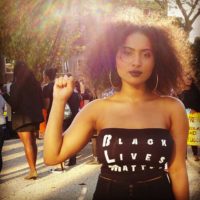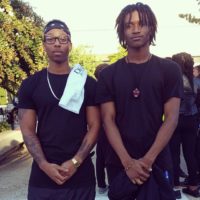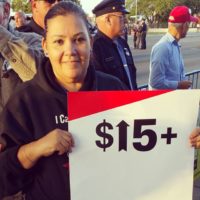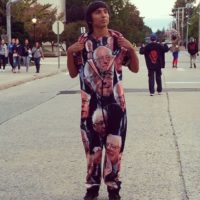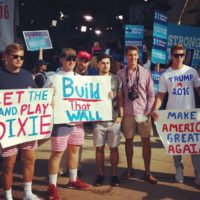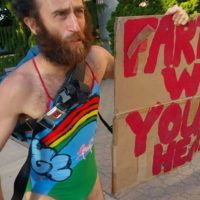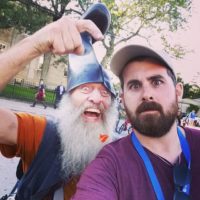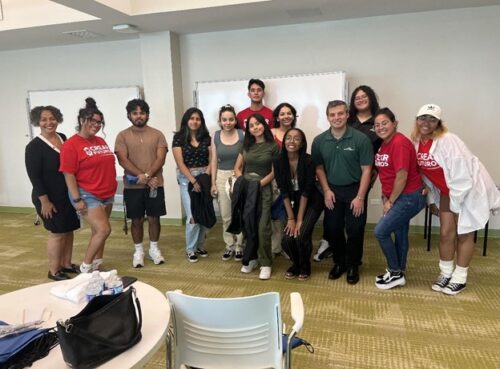- Vanessa Chouest
- Myraan Mays and Tyrique Brown
- Flavia Cabral
- Oscar Salazar
- Hofstra Freshmen
- Vermin Supreme & Supporters
- Matthew Silver
By Bobby Reilly
In 2008, Hofstra hosted its first Presidential Debate between then-Senator Barack Obama and Senator John McCain, and I began my first semester as a college student at the university. Four years later, though no longer a student, I made my way back to Hofstra University to attend their second Presidential Debate between President Obama and Governor Mitt Romney. This year’s debate held special significance, not only because it is an historic third-consecutive debate for Hofstra University, but also for me personally as my third consecutive debate: First as an 18 year old freshman at Hofstra, then in 2012 as a private citizen and voter, and now, this year, as a reporter for The Catalyst here at Old Westbury.
This year was different. It was different because we have two candidates who share unprecedented unfavorable ratings. It was different because security on the college campus, as well as in the surrouding neighborhood, was at an all time high with more than 1,000 Nassau County Police Officers on-scene, according to Newsday. But I think what made this year so strikingly different from debates of the past, was the overwhelmingly somber, serious tone and high-stakes mentality of the voters with whom I spoke. There weren’t quite as many funny posters and signs as in years of past, and I found the average person on the college grounds genuinely fearful of the possibility of their candidate losing in November.
An estimated 84 million Americans fixed their gaze toward Hofstra University on Monday, 26 September 2016 to watch Democrat Hillary Clinton and Republican Donald Trump square-off face-to-face for the first time. This was a record-setting number of viewers for a presidential debate and it is a testament to the importance the American people are placing on the fate of this election.
Hofstra University is divided into two parts: a residential (north) side, and an academic (south) side.
The north side of the campus was a sea of political creatures. Parking lots and sidewalks were littered with enormous tents housing various media outlets. Fox, MSNBC, and CNN had their stages and had been broadcasting live from the campus since the beginning of the weekend.
Van Jones, political contributor for CNN and former White House Council on Environmental Quality under President Obama, was available for comment if one was willing to shout for his attention. As a skilled and experienced political operative, Jones was ready with the sound-byte, “There are only two Trumps: Terrible Trump and Tele-prompter Trump.” With regard to what Clinton would have to do to win the debate, Jones went on to say, “It’s not good enough to disqualify him, she has to qualify herself.”
Jones is a Clinton supporter, and when pressed about the threat of third-party candidates Dr. Jill Stein of the Green Party and Fmr. Gov. Gary Johnson of the Libertarian Party, Jones raised little concern, believing that the existential threat of Donald Trump is enough to scare the undecided voter into Clinton’s camp:
I think right now the third-party candidates are doing real damage to Hillary Clinton…This summer when [Trump] is slipping on every banana-peel known to man, it’s easy to say, ‘Look i’m going to vote for the Libertarian or Green Party person’, but you get a couple of weeks in a row where he’s leading her in the polls, I think you see a lot of people come away from some of those Libertarian and Green Party votes.
The south side of campus was much more about policy and ideas, and much less about media and political machinations.
Margaret Melkonian is a founding member of the LI Alliance for Peaceful Alternatives, an anti-war and anti-nuclear weapons activist organization started in 1985 in Long Island, New York. With her husband, Marty, who has been an economics professor at Hofstra University for fifty years, Margaret helped create an on-campus Peace Zone which, according to her press release, is a “non-violent, peaceful demonstration and rally with community members and students bringing their voices and signs about the issues they care about and asking the questions they want the presidential candidates to address.”
In this Peace Zone, at approximately five o’clock, a Black Lives Matter (BLM) rally began in front of the Frederick Douglass statue at Monroe Hall. Students and community members of all ages and races were in attendance, among them Freshmen Myraan Mays (18), Tyrique Brown (18), and Vanessa Chouest (18). Tyrique Brown, from Brooklyn, spoke calmly and passionately about his frustrations with the BLM’s message being distorted by the media as vehemently anti-police. After Nassau County Police Officers encouraged him to sign up for the NCPD test, Brown was gracious and had no ill-will toward law enforcement. He said, “A cop is a good position automatically. It’s bad people in good positions that mess everything up.”
The debate was scheduled to kick-off at 9pm, and as the sun set and the golden-red rays glared and gleamed off of a “Giant Douche v. Turd Sandwich” sign, I looked around at the unexpected calm before the storm. Hempstead Turnpike cuts cleanly through the Hofstra campus dividing the north side from the south. Pairs of Nassau County Police Officers every ten yards coupled with metal barricades closing off all access to the Turnpike, the roadway became a kind of no man’s land: a silent, wide and dark chasm. An armored purgatory between the “lights, camera, action” of the north, and the disillusioned-yet-hopeful disenfranchised voters of the south.
Days such as these, where one can easily become entranced by the bright lights, offensive signs, high passions and sometimes flaring tempers, are examples of how distorted our political landscape has become. Behind all of the red-white-and-blue are the people fighting for a living wage, the people who ask simply for equal treatment before the law. When the cameras are turned off and the two major-party candidates board their private planes and fly away, these activists and organizers will not have the seemingly-endless media outlet which was this debate event, and will return to the daily grind that is progress. The human cost of American Politics is rarely discussed because it’s not good for business.
Despite the anxiety felt by most American voters this election year, nearly everyone I spoke with retains their optimism for the future. These students and faculty are in the streets, promoting their agendas through peaceful and articulate means. They will not be dissuaded or succumb to fear. They are American voters who, no matter what, will persevere.

